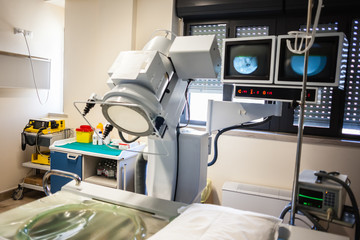
Urology Doctors, also known as urologists, are medical professionals who specialize in diagnosing and treating conditions that affect the urinary tract and male reproductive system. They play a vital role in helping patients to maintain healthy urinary and reproductive systems, and in diagnosing and treating a range of disorders that can affect these systems.
What is Urology Doctor:
Urology Doctor The urinary system is responsible for removing waste and excess fluids from the body, and it includes the kidneys, ureters, bladder, and urethra. The male reproductive system includes the penis, testes, and prostate gland. Urology doctors are trained to diagnose and treat conditions that affect both of these systems.
Some of the most common conditions that urology doctors treat include urinary tract infections, kidney stones, bladder cancer, prostate cancer, and erectile dysfunction. They also treat a range of other conditions, such as incontinence, male infertility, and interstitial cystitis.
Urology doctors play a crucial role in the early detection and treatment of cancer in the urinary and reproductive systems. They use a range of diagnostic tools, such as ultrasounds, biopsies, and blood tests, to identify potential cancerous growths or tumors. Once a diagnosis is made, they work with patients to develop a treatment plan that may include surgery, radiation therapy, or chemotherapy.
What We Should Know About The Urology Doctor:
In addition to treating cancer, urology doctors are also skilled in treating non-cancerous conditions of the urinary and reproductive systems. For example, they can help patients manage conditions like urinary incontinence, which can be caused by a range of factors, including age, childbirth, and nerve damage. Urology doctors can also treat conditions like erectile dysfunction, which can have a significant impact on a patient's quality of life.
Urology doctors are trained to perform a range of surgical procedures that are used to treat both cancerous and non-cancerous conditions of the urinary and reproductive systems. These procedures may include minimally invasive surgeries, such as laparoscopic surgery, as well as more invasive procedures, such as open surgery. In some cases, urology doctors may use robotic surgery, which allows for more precise and controlled movements during the surgery.
In addition to treating patients in a clinical setting, urology doctors also play an important role in educating patients about their conditions and helping them to make informed decisions about their treatment options. They work closely with patients to develop individualized treatment plans that take into account the patient's age, medical history, and overall health status.
Urology Doctor Work medical professionals:
Urology doctors also work closely with other medical professionals, such as oncologists, radiologists, and primary care physicians, to provide coordinated care to patients. This collaboration ensures that patients receive the most comprehensive and effective care possible.
If you are experiencing symptoms related to your urinary or reproductive system, it is important to seek the advice of a urology doctor. These medical professionals are skilled in diagnosing and treating a range of conditions, and they can work with you to develop a treatment plan that is tailored to your individual needs.
In conclusion, urology doctors play a vital role in the treatment of urinary and reproductive disorders. They are trained to diagnose and treat a range of conditions, from urinary tract infections to prostate cancer, and they work closely with patients to develop individualized treatment plans. If you are experiencing symptoms related to your urinary or reproductive system, it is important to seek the advice of a urology doctor, who can provide you with the care and support you need.
Urology Doctor, How does Its Work?
Urology doctors, also known as urologists, are medical professionals who specialize in diagnosing and treating conditions that affect the urinary tract and male reproductive system. Their work involves a range of diagnostic and treatment procedures that are designed to help patients maintain healthy urinary and reproductive systems, and to diagnose and treat a variety of disorders that can affect these systems.
Here are some of the key ways in which urology doctors work:
Diagnosing conditions: Urology doctors use a range of diagnostic tools and procedures to identify conditions that affect the urinary and reproductive systems. These may include physical exams, blood and urine tests, imaging studies (such as ultrasounds or CT scans), and biopsies. Based on the results of these tests, urology doctors can diagnose conditions such as urinary tract infections, kidney stones, prostate cancer, and erectile dysfunction.
Developing treatment plans: Once a condition has been diagnosed, urology doctors work with patients to develop individualized treatment plans. These plans may include medication, lifestyle changes, or surgical procedures. The goal of treatment is to improve the patient's symptoms, prevent complications, and help the patient maintain a healthy urinary and reproductive system.
Performing surgical procedures: Urology doctors are trained to perform a wide range of surgical procedures that are used to treat both cancerous and non-cancerous conditions of the urinary and reproductive systems. Some of the most common procedures include prostatectomies (removal of the prostate gland), cystectomies (removal of the bladder), and nephrectomies (removal of the kidney). In some cases, urology doctors may use minimally invasive techniques, such as laparoscopic surgery, which can reduce pain and recovery time for patients.

If you want to get amazing benefits by using this link
Managing chronic conditions: Urology doctors also work with patients who have chronic conditions that require ongoing management, such as urinary incontinence or interstitial cystitis. These conditions can be challenging to treat, and urology doctors may work closely with other medical professionals, such as physical therapists or pain management specialists, to develop comprehensive treatment plans.
Educating patients: Urology doctors play an important role in educating patients about their conditions and treatment options. They may provide information about lifestyle changes, medication management, or surgical procedures. Urology doctors may also help patients to manage anxiety or stress related to their condition, and provide emotional support throughout the treatment process.
Conclusion:
Overall, urology doctors are essential in helping patients maintain healthy urinary and reproductive systems, and in diagnosing and treating a wide range of disorders that can affect these systems. Their work is focused on improving patient outcomes and quality of life, and they play a critical role in helping patients to manage chronic conditions and navigate complex treatment options.


